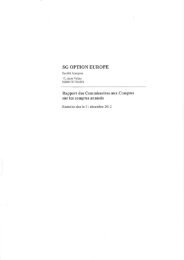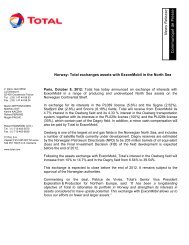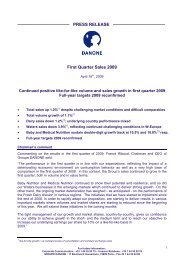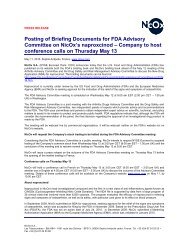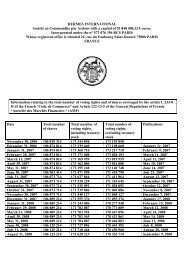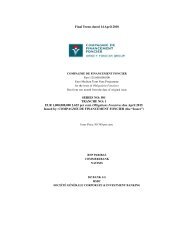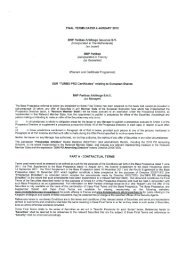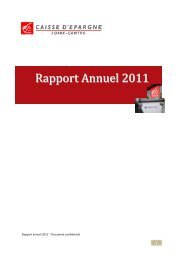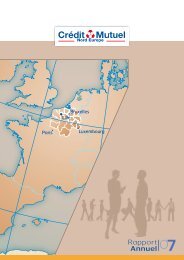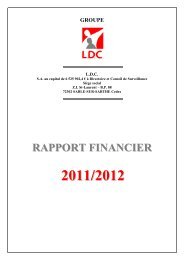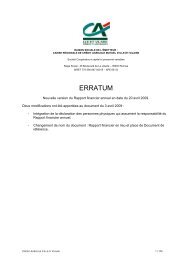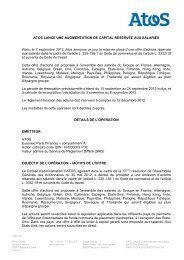Financial Reporting - Rexel
Financial Reporting - Rexel
Financial Reporting - Rexel
Create successful ePaper yourself
Turn your PDF publications into a flip-book with our unique Google optimized e-Paper software.
19.1.3 | Securitization programs<br />
The <strong>Rexel</strong> Group runs several securitization programs presented in the table below, which enable it to obtain<br />
financing at a lower cost than issuing bonds or bank loans.<br />
The specific characteristics of the <strong>Rexel</strong> Group’s securitization programs vary depending on the country. The<br />
relevant subsidiaries remain responsible for the collection of receivables once assigned. These receivables<br />
are assigned to special-purpose entities operating with no action required by the subsidiaries. The special<br />
purpose vehicles obtain the financing required to purchase these receivables, notably through the issuance<br />
of short-term debt instruments such as French, US, or Canadian commercial paper, which is rated by rating<br />
agencies.<br />
In exchange for the assigned receivables, the subsidiaries receive a cash payment from the special purpose<br />
vehicle, the amount of which represents the value of the receivables minus an amount committed to<br />
guarantee their recovery, which latter amount is only reimbursed, in whole or in part, after complete payment<br />
of the receivables. However, under certain programs, the Group also has the option of contributing its<br />
receivables in exchange for subscribing the securitization vehicle's subordinated notes.<br />
In view of their characteristics, notably the fact that the Group retains a significant part of the late payment<br />
and credit risks, these receivables assignment programs, with the exception of the off-balance sheet US<br />
program such as disclosed in note 11.2, do not qualify for derecognition under IAS 39 requirements.<br />
Therefore, assigned receivables remain classified as assets on the Group’s balance sheet on the line “Trade<br />
accounts receivable” whereas the financing received is shown as financial debt.<br />
Securitization programs are subject to certain covenants concerning the quality of the trade receivables<br />
portfolio including dilution (ratio of credit notes to eligible receivables), delinquency and default criteria (aging<br />
ratios measured respectively as overdue and doubtful receivables to eligible receivables). As of December<br />
31, 2011, <strong>Rexel</strong> had satisfied all of these covenants.<br />
On December 19th, 2011 <strong>Rexel</strong> entered into a new securitization program in France, the United Kingdom<br />
and Australia to replace the previous one originally matured in February 2012. This program is for a<br />
maximum amount of €425 million over a five-year period.<br />
The features of <strong>Rexel</strong>’s securitization programs including the off-balance sheet programs are summarized in<br />
the table below:<br />
Program<br />
2011 - Europe<br />
and Australia<br />
(1)<br />
Commitment Amount of Amount<br />
receivables drawn down<br />
assigned as as of<br />
of December December 31,<br />
31, 2011 2011<br />
(in millions of currency)<br />
December<br />
31, 2011<br />
Balance as of<br />
December<br />
31, 2010<br />
(in millions of euros)<br />
Repayment<br />
EUR 425.0 EUR 610.1 EUR 428.6 428.6 444.8 16/12/2016<br />
United States USD 470.0 USD 579.3 USD 373.9 289.0 278.0 23/12/2014<br />
Canada CAD 140.0 CAD 270.3 CAD 140.0 105.9 105.1 13/12/2012<br />
2008 - Europe EUR 450.0 EUR 509.5 EUR 358.7 358.7 337.3 17/12/2013<br />
TOTAL 1 182.2 1 165.3<br />
Of which : - on balance sheet: 1 079.4 1 067.6<br />
- off balance sheet (Ester program) : 102.8 97.7<br />
(1)<br />
Securitization program subscribed in 2011, replacing the previous program initiated in 2005<br />
These securitization programs pay interest at variable rates plus a spread which is specific to each program.<br />
As of December 31, 2011, the total outstanding amount authorized for these securitization programs was<br />
€1,344.2 million, of which €1,182.2 million was utilized.<br />
19.1.4 | Commercial paper program<br />
In September 2010, <strong>Rexel</strong> launched a €500 million commercial paper program with fixed maturities ranging<br />
from one to three months depending on the notes issued to diversify its investor base and minimize the cost<br />
of financing.<br />
As of December 31, 2011, the company had issued €104.8 million of commercial paper (€56.9 million as of<br />
December 31, 2010).<br />
70



